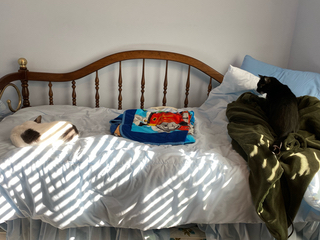- These list items are microformat entries and are hidden from view.
- https://dltj.org/article/issue-89-ukraine-libraries-russia-internet/
 Peter Murray
Peter Murray- The first story below is one from National Public Radio on Ukraine libraries’ efforts are undertaking. Let’s not forget the terror they are facing, the people stepping up to meet their community’s needs, and those who have lost their lives in the Russian war.The threads this week: Ukraine Libraries Doing What Libraries Do Can the Internet Sanction a Country? Should It? Thursday Threads 2011: The Demise of the Big Deal?Feel free to send this newsletter to others you think might be interested in the topics. If you are not already subscribed to DLTJ’s Thursday Threads, visit the sign-up page.If you would like a more raw and immediate version of these types of stories, follow me on Mastodon where I post the bookmarks I save. Comments and tips, as always, are welcome.Ukraine Libraries Doing What Libraries Do "Refugee reception points, hostels and logistics points are organized here," [Oksana Brui, president of the Ukrainian Library Association] said. "Camouflage nets for the military are also woven here. Home care courses are held here. Books are collected here to be transferred to libraries in neighboring countries that receive Ukrainian refugees." —Ukraine's libraries are offering bomb shelters and camouflage classes, NPR, 9-Mar-2022 I’m not surprised. I presume the libraries mentioned in the NPR article are “public libraries,” but they could be libraries of any type. It brings to mind the stories about the library in Ferguson, Missouri, during the riots for the shooting of Michael Brown by local police. The NPR story also mentions Nicholas Poole’s “we will reschedule just as soon as we have vanquished our invaders” tweet that was in Thursday Threads two weeks ago.Can the Internet Sanction a Country? Should It? The invasion of Ukraine poses a new challenge for multistakeholder Internet infrastructure governance. In this statement, we discuss possible sanctions and their ramifications, lay out principles that we believe should guide Internet sanctions, and propose a multistakeholder governance mechanism to facilitate decision-making and implementation. —Multistakeholder Imposition of Internet Sanctions [PDF], Packet Clearing House, 10-Mar-2022 Last week, Ukraine’s Ministry of Digital Transformation called on internet bodies to sanction Russia over its government’s war on Ukraine. This would include revoking Russia’s top-level country domains (e.g. “.ru”), canceling SSL certificates associated with Russian sites, disabling the root DNS servers, and withdrawing the right for Russian internet service providers to use the IP addresses that have been assigned to the country. The Multistakeholder Imposition of Internet Sanctions document describes why this would be a bad idea and lays out a plan for what can be done. For more depth, see the article I wrote last week on the document.Thursday Threads 2011: The Demise of the Big Deal?Looking backward, the Thursday Threads for 17-Mar-2011 had an entry for an interview by Richard Poynder with a financial analyst that had a downgraded outlook of Reed Elsevier. A key quote: “I can observe, however, that there is something unhealthy about an industry which has managed to alienate its customers to the point their membership associations increasingly focus time and attention on how to overturn the industry structure.”I think it is fair to say that not much has changed.Note! After the newsletter was published, Richard tweeted: "The Aspesi interview is worth comparing with the 2013 interview with Sami Kassab I think." The tweet included a link to his 6-Oct-2013 interview. About halfway down Richard's summary is a discussion about how reputation is a dominant factor in where authors choose to publish, which will favor the large, incumbent publishers. Nearly 10 years later, it would seem that Mr. Kassab's prediction has held true.This Week’s Cats This is a throwback to a picture of Alan (left) and Mittens (right) from six weeks ago. In that picture, there was a pillow fence between the two. This time? No fence!So there is no reason why my two cats have to dominate the Thursday Threads newsletter. Do you have a picture of a cat (your cat or a library cat) doing what cats do? (Which, as you can tell from my two lovable felines, is to be extraordinarily cute.) Tweet your picture to me or send it by email along with a brief bio, and I’ll add your adorable pussycat to an upcoming newsletter.
- 2022-03-17T00:00:00+00:00
- 2024-07-20T16:35:17+00:00
Issue 89: Ukraine’s Libraries, Russia’s Internet, and the Big Deal
The first story below is one from National Public Radio on Ukraine libraries’ efforts are undertaking. Let’s not forget the terror they are facing, the people stepping up to meet their community’s needs, and those who have lost their lives in the Russian war.
The threads this week:
- Ukraine Libraries Doing What Libraries Do
- Can the Internet Sanction a Country? Should It?
- Thursday Threads 2011: The Demise of the Big Deal?
Feel free to send this newsletter to others you think might be interested in the topics. If you are not already subscribed to DLTJ’s Thursday Threads, visit the sign-up page. If you would like a more raw and immediate version of these types of stories, follow me on Mastodon where I post the bookmarks I save. Comments and tips, as always, are welcome.
Ukraine Libraries Doing What Libraries Do
"Refugee reception points, hostels and logistics points are organized here," [Oksana Brui, president of the Ukrainian Library Association] said. "Camouflage nets for the military are also woven here. Home care courses are held here. Books are collected here to be transferred to libraries in neighboring countries that receive Ukrainian refugees."
I’m not surprised. I presume the libraries mentioned in the NPR article are “public libraries,” but they could be libraries of any type. It brings to mind the stories about the library in Ferguson, Missouri, during the riots for the shooting of Michael Brown by local police. The NPR story also mentions Nicholas Poole’s “we will reschedule just as soon as we have vanquished our invaders” tweet that was in Thursday Threads two weeks ago.
Can the Internet Sanction a Country? Should It?
The invasion of Ukraine poses a new challenge for multistakeholder Internet infrastructure governance. In this statement, we discuss possible sanctions and their ramifications, lay out principles that we believe should guide Internet sanctions, and propose a multistakeholder governance mechanism to facilitate decision-making and implementation.
Last week, Ukraine’s Ministry of Digital Transformation called on internet bodies to sanction Russia over its government’s war on Ukraine. This would include revoking Russia’s top-level country domains (e.g. “.ru”), canceling SSL certificates associated with Russian sites, disabling the root DNS servers, and withdrawing the right for Russian internet service providers to use the IP addresses that have been assigned to the country. The Multistakeholder Imposition of Internet Sanctions document describes why this would be a bad idea and lays out a plan for what can be done. For more depth, see the article I wrote last week on the document.
Thursday Threads 2011: The Demise of the Big Deal?
Looking backward, the Thursday Threads for 17-Mar-2011 had an entry for an interview by Richard Poynder with a financial analyst that had a downgraded outlook of Reed Elsevier. A key quote: “I can observe, however, that there is something unhealthy about an industry which has managed to alienate its customers to the point their membership associations increasingly focus time and attention on how to overturn the industry structure.” I think it is fair to say that not much has changed.
Note! After the newsletter was published, Richard tweeted: "The Aspesi interview is worth comparing with the 2013 interview with Sami Kassab I think." The tweet included a link to his 6-Oct-2013 interview. About halfway down Richard's summary is a discussion about how reputation is a dominant factor in where authors choose to publish, which will favor the large, incumbent publishers. Nearly 10 years later, it would seem that Mr. Kassab's prediction has held true.
This Week’s Cats

This is a throwback to a picture of Alan (left) and Mittens (right) from six weeks ago. In that picture, there was a pillow fence between the two. This time? No fence!
So there is no reason why my two cats have to dominate the Thursday Threads newsletter. Do you have a picture of a cat (your cat or a library cat) doing what cats do? (Which, as you can tell from my two lovable felines, is to be extraordinarily cute.) Tweet your picture to me or send it by email along with a brief bio, and I’ll add your adorable pussycat to an upcoming newsletter.

